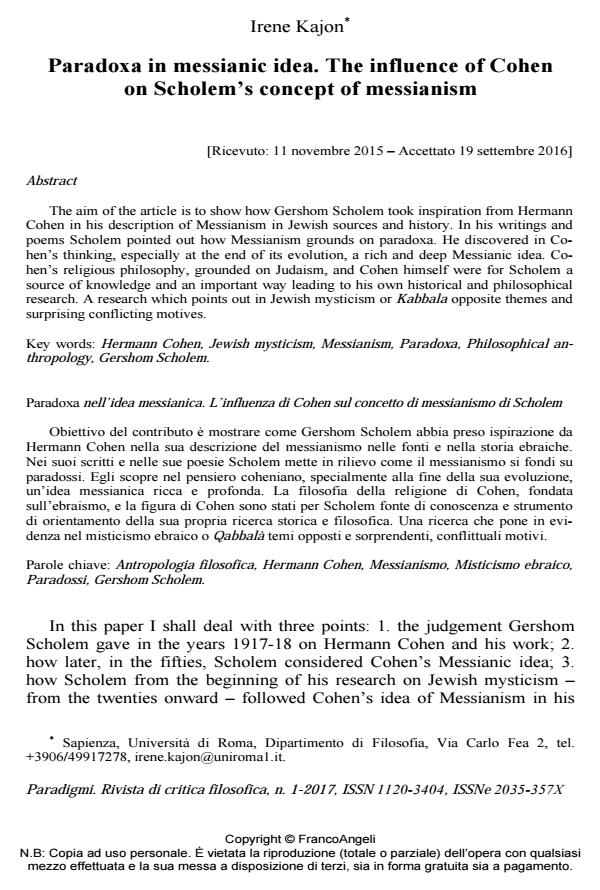Paradoxa in messianic idea. The influence of Cohen on Scholem’s concept of messianism
Titolo Rivista PARADIGMI
Autori/Curatori Irene Kajon
Anno di pubblicazione 2017 Fascicolo 2017/1
Lingua Inglese Numero pagine 14 P. 129-142 Dimensione file 170 KB
DOI 10.3280/PARA2017-001009
Il DOI è il codice a barre della proprietà intellettuale: per saperne di più
clicca qui
Qui sotto puoi vedere in anteprima la prima pagina di questo articolo.
Se questo articolo ti interessa, lo puoi acquistare (e scaricare in formato pdf) seguendo le facili indicazioni per acquistare il download credit. Acquista Download Credits per scaricare questo Articolo in formato PDF

FrancoAngeli è membro della Publishers International Linking Association, Inc (PILA), associazione indipendente e non profit per facilitare (attraverso i servizi tecnologici implementati da CrossRef.org) l’accesso degli studiosi ai contenuti digitali nelle pubblicazioni professionali e scientifiche.
The aim of the article is to show how Gershom Scholem took inspiration from Hermann Cohen in his description of Messianism in Jewish sources and history. In his writings and poems Scholem pointed out how Messianism grounds on paradoxa. He discovered in Cohen’s thinking, especially at the end of its evolution, a rich and deep Messianic idea. Cohen’s religious philosophy, grounded on Judaism, and Cohen himself were for Scholem a source of knowledge and an important way leading to his own historical and philosophical research. A research which points out in Jewish mysticism or Kabbala opposite themes and surprising conflicting motives.
Obiettivo del contributo è mostrare come Gershom Scholem abbia preso ispirazione da Hermann Cohen nella sua descrizione del messianismo nelle fonti e nella storia ebraiche. Nei suoi scritti e nelle sue poesie Scholem mette in rilievo come il messianismo si fondi su paradossi. Egli scopre nel pensiero coheniano, specialmente alla fine della sua evoluzione, un’idea messianica ricca e profonda. La filosofia della religione di Cohen, fondata sull’ebraismo, e la figura di Cohen sono stati per Scholem fonte di conoscenza e strumento di orientamento della sua propria ricerca storica e filosofica. Una ricerca che pone in evidenza nel misticismo ebraico o Qabbalà temi opposti e sorprendenti, conflittuali motivi.
Parole chiave:Antropologia filosofica, Hermann Cohen, Messianismo, Misticismo ebraico, Paradossi, Gershom Scholem
Irene Kajon, Paradoxa in messianic idea. The influence of Cohen on Scholem’s concept of messianism in "PARADIGMI" 1/2017, pp 129-142, DOI: 10.3280/PARA2017-001009